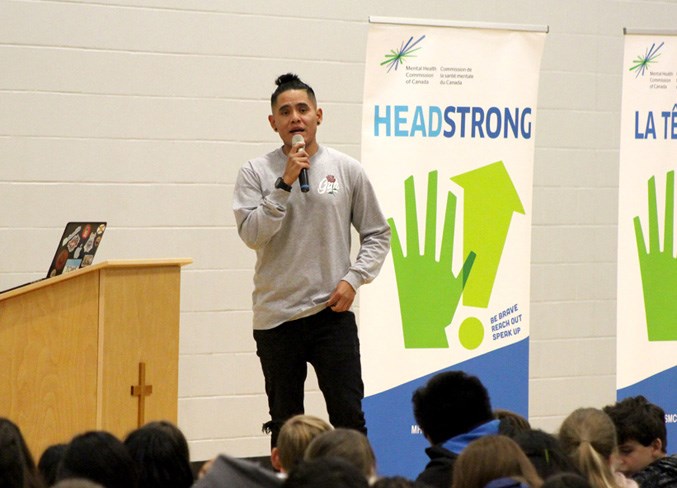Local students came together to be brave, reach out, and speak up about mental health.
Students from across the Lakeland Catholic School District (LCSD) participated in the Headstrong summit, a seminar that teaches attendees how to become mental health champions in their schools. The event was held at Notre Dame High School (NDHS) on Thursday, Oct. 17 and at Cold Lake’s Assumption Jr./Sr. High School on Friday, Oct. 18.
Students from NDHS, Dr. Bernard Brosseau School, Holy Family Catholic School, and Kehewin Jr./Sr. High School were in Bonnyville for the full-day seminar to learn ways they could break down the stigma surrounding mental health locally.
“We wanted to have as far of a reaching impact as possible,” noted LCSD communications officer Amanda Wildman. “This symposium is really geared towards middle school to senior high school, which is why we invited some of the middle schoolers to participate. Then we opened it up to some of our First Nations and Métis communities, because we wanted to include them in the opportunity.”
According to Nathan Ip, provincial coordinator of Headstrong, it’s the only evidence-based youth mental health leadership program in Canada.
“We know that Headstrong works because we have literally thousands of young people across the country taking action to make positive change in their own communities promoting mental wellness.”
After listening to the keynote speaker Brett Spring Chief, a Canadian hip hop artist, students broke off into groups to discuss mental health and listen to others who have been impacted by mental illness. They later participated in a drumming circle before brainstorming ways to address the stigma surrounding mental illness and how they could combat it in their local communities.
Ip said stigma is “the number one barrier to people seeking treatment and the support they need.”
“We know that 75 per cent of kids who have mental health struggles or mental health concerns aren’t getting the help that they need,” he added.
Spring Chief noted he was among that percentile growing up.
“I went through hell as a teenager dealing with what I was dealing with, but the scary thing was I didn’t know what I was dealing with. That’s a very lonely feeling, to feel like you’re the only one going through something. You feel like you aren’t part of this world,” he expressed.
Although he had dealt with symptoms for a majority of his life, Spring Chief wasn’t diagnosed with Obsessive Compulsive Disorder (OCD) until he was in his 20s.
He shared his story of growing up with an alcoholic father who was violent, and how the traumatic events left a lasting impression on him.
It wasn’t until he eventually reached out to get help with his mental health that he started to heal through music and learned ways of coping with his anxiety and OCD symptoms.
Discussing stigma surrounding mental health with fellow students was a highlight for Morgan Gillis, who’s in Grade 9 at NDHS.
“It taught us about the awareness you have if you have a mental illness, and what it would feel like if you had one,” she recalled.
In the afternoon, the groups brainstormed ways they could bring what they learned from Headstrong into the community.
“They had the opportunity during the symposium to develop an action plan that they can take back to their schools afterwards,” explained Wildman. “They had lot of takeaways, and there will be something that they can initiate in their school as a legacy to the symposium.”
NDHS Grade 10 student Malachi Badger already had a few ideas in mind.
“I think I might just gather a couple of kids, make some posters, and go around showing the wonderful vibe that I want to give off to people so they have a good day.”
Wildman described Headstrong as a good starting place for addressing issues surrounding mental health.
“As schools, we’re always in a position where we can have far-reaching influence and we wanted to see what it is we can do to get our kids thinking about these things and our staff, to get them thinking about ways we can break down some of the barriers,” she detailed.
Badger hoped students learned that help is always available to those who need it.
“It’s something that people have to deal with, but they know that it can be dealt with and the people that have mental illnesses know that it’s common, a lot of people have them and learn to live with them,” he said.



